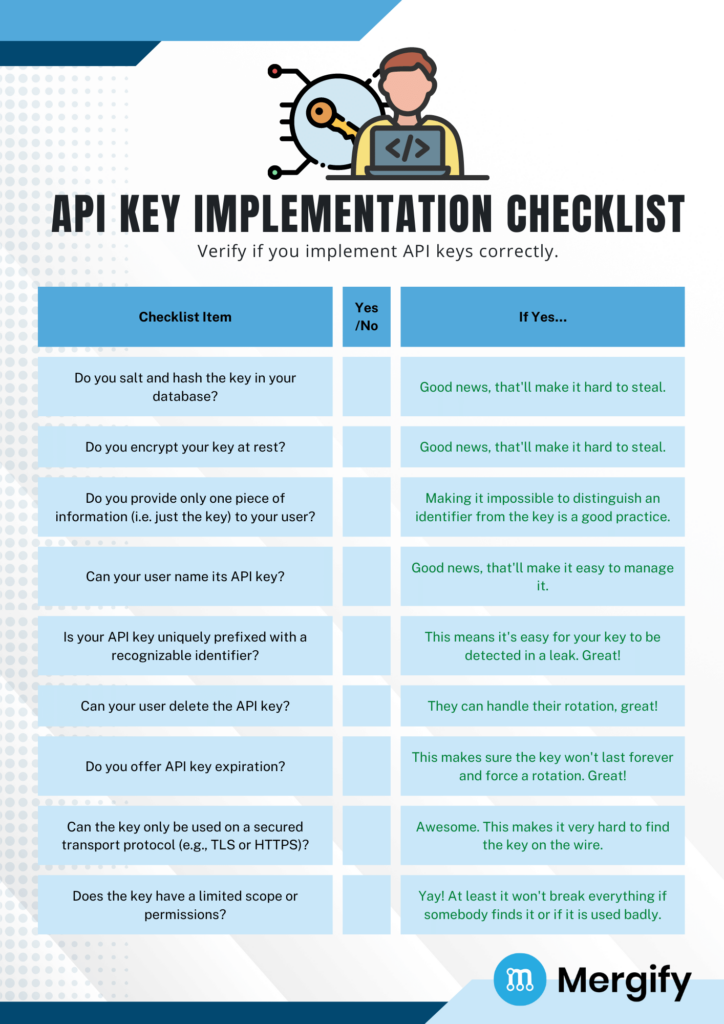Implementing API key expiration policies is an essential aspect of enhancing the security of APIs and web services. By setting expiration dates on API keys, organizations can mitigate the risk of unauthorized access and potential breaches. Timely rotation of API keys ensures that even if a key is compromised, the window of vulnerability is minimized. Additionally, enforcing expiration policies encourages developers to regularly review and update their integrations, promoting overall system hygiene and security best practices. In this way, API key expiration policies play a crucial role in safeguarding sensitive data and maintaining the integrity of APIs and web services.
In the realm of APIs & Web Services, security is a paramount concern. Implementing effective API key expiration policies can significantly enhance the security of your application by minimizing the risk of unauthorized access and ensuring that your API keys are used appropriately. In this comprehensive guide, we will explore the best practices for establishing API key expiration policies and the implementation strategies that can help maintain a robust security posture.
Understanding API Keys
API keys serve as a unique identifier and token for authenticating requests made to an API. They are crucial for a variety of operations, including:
- Authentication of users and systems
- Rate limiting to manage usage
- Tracking API usage for analytics
However, if not managed correctly, API keys can become a significant security vulnerability. This is where implementing an expiration policy becomes crucial.
Why Implement API Key Expiration Policies?
API key expiration policies are essential for several reasons:
- Minimized Risk: Regularly expiring API keys reduces the risk of keys being compromised and misused.
- Controlled Access: Expired keys require re-issuance, providing an opportunity to verify user identity and access level.
- Audit and Compliance: Expiration policies help ensure compliance with security standards by regularly reviewing access credentials.
- Improved Management: Keeping API keys fresh allows for better management and generation of new keys with improved algorithms.
Best Practices for Implementing API Key Expiration Policies
1. Set a Reasonable Expiration Time
The first step in creating an effective API key expiration policy is to determine a reasonable expiration time for your API keys. Consider the following:
- User Type: Different users may require different expiration times based on their access levels.
- Use Case: Keys used for short-lived operations might have a shorter lifespan than those for ongoing integrations.
- Security Needs: Higher-security requirements should lead to shorter expiration times.
2. Implement Refresh Tokens
Consider implementing refresh tokens alongside your API keys. Refresh tokens are special tokens that allow clients to renew access tokens without requiring user re-authentication. This helps maintain security while minimizing user disruption. Here’s how to use refresh tokens:
- Issue a refresh token along with the API key upon initial authentication.
- Set a longer expiration time for the refresh token compared to the access token.
- Allow clients to exchange the refresh token for a new API key when the old key expires.
3. Monitor API Key Usage
Implement logging and monitoring on your APIs to track the usage of API keys. This helps you understand how often keys are used, when they expire, and when someone is trying to use an expired key:
- Access Reports: Create logs that display when and how API keys are used.
- Alerts: Set notifications for unusual usage patterns, such as attempts to access the API using expired keys.
- Analytics: Integrate analytics tools to monitor key usage and make informed decisions about expiration policies.
4. Automate Key Expiration and Revocation
Using automated tools can simplify the management of API key expiration:
- Automatic Expiration: Use scheduled jobs to automatically deactivate expired keys in your database.
- Revocation Mechanism: Allow for manual revocation of keys when security incidents are detected.
- Feedback Loops: Implement user feedback mechanisms to address access issues caused by expired keys.
5. Notify Users of Key Expiration
Communication is key in managing API key expiration. Keep your users informed:
- Email Notifications: Send out notifications before the key’s expiration date to remind users to renew their keys.
- Dashboard Alerts: Provide alerts in user dashboards for low or soon-to-expire keys.
- Documentation: Clearly document expiration policies and renewal processes in your API documentation.
6. Establish a Clear Policy for Key Rotation
Regularly rotating API keys is a significant part of your expiration policies. Consider the following points:
- Frequency: Decide how often keys should be rotated based on your security needs.
- Legacy Support: Ensure that older keys remain valid for a limited time after new keys are issued to avoid disruption.
- Key Rotation Process: Create a seamless process for users to rotate their keys without service interruption.
Challenges of API Key Expiration Policies
While implementing API key expiration policies is crucial, it does not come without challenges:
- User Experience: Frequent expiration can frustrate users if not handled appropriately, leading to complaints or access issues.
- Legacy Integrations: Older systems may struggle with new expiration policies, requiring additional support and adjustments.
- Communication Overhead: Keeping users informed demands resources in monitoring and responding to queries.
Conclusion
API key expiration policies are a vital aspect of securing APIs and web services. By following established best practices, you can significantly reduce the risk of unauthorized access, maintain control over API usage, and foster trust with your users.
Implementing API key expiration policies is a crucial security measure to protect APIs and Web Services. By setting expiration dates for API keys, organizations can reduce the risk of unauthorized access and misuse of API resources. This proactive approach helps enhance security posture, mitigate potential threats, and uphold data integrity. Overall, implementing API key expiration policies is essential for maintaining a secure and resilient API ecosystem.










